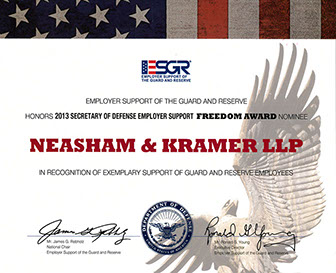Call for a free consultation: 916-853-8030
or email: dcarrillo@neashamlaw.com
Is Your Corporation Really Protecting You from Personal Liability?
By Erica Brinitzer
Many business owners are savvy enough to recognize the benefits and liability protection associated with incorporating their business. Corporations are generally treated as a separate legal entity, with separate liabilities and obligations from its owners. Therefore, many business owners assume that incorporating their business will protect them from being personally liable for the business’s debts and liabilities.
Unfortunately, many business owners fail to recognize that merely filing articles of incorporation with the secretary of state is not enough to protect their personal assets from the corporation’s creditors. In order for a corporation to be treated as a separate legal entity, the corporation must be managed as one. This includes appointing a board of directors, electing executive officers, holding director and shareholder meetings, and managing the corporation’s finances and accounts as separate from that of the shareholders.
This can often be a problem for small business owners who are the sole shareholders in their corporations. While these business owners want the personal liability protection afforded by the corporate entity, they do not want to be forced to drastically alter their day-to-day management of their businesses. Holding board of directors’ meetings and appointing officers of the corporation seem like an unnecessary hassle for a sole shareholder who is already effectively running his or her business.
However, in order to ensure that their corporation is actually providing protection from personal liability, it is of the utmost importance that shareholders go through the process of adopting corporate bylaws, appointing a board of directors, electing officers, setting up bank accounts, and establishing the corporation as an entity separate and apart from its shareholders. If these and other corporate formalities are not properly followed, the shareholders are at risk of being held personally liable for the corporation’s debts and liabilities. The rationale is that if shareholders do not properly maintain their corporation as a separate entity, they should not be able to hide behind the “corporate veil” and protect themselves from personal liability to the corporation’s creditors.
Luckily, corporate bylaws, and if necessary, the use of a shareholders agreement, can be structured to significantly decrease the difficulties associated with complying with the necessary corporate formalities. Limited Liability Companies (LLCs) also provide an effective means by which to protect business owners from personal lability and can be structured so as to eliminate the need for many of the corporate formalities associated with corporations.
An experienced business attorney can assist you with selecting and structuring the most appropriate form for your business entity to ensure you remain protected from personal liability without having to sacrifice the ease of running your business. While many business owners shy away from spending the extra time and expense to retain an attorney to help them properly structure their business up front, doing so often saves business owners substantial money down the road and ensures that business owners are actually receiving the personal liability protection they desire.
December 2015
The Importance of Exhausting Administrative Remedies
By Brianna M. Neasham
Employees considering whether to file a civil lawsuit against their employer for work-related misconduct may be unaware of the procedural hoops they must jump through before they may be eligible to pursue civil litigation in a court of law.
This frequently involves filing a complaint with an Administrative Agency established by Congress or the State of California to handle grievances that occur under its particular purview.
For example:
- The Fair Employment and Housing Act (FEHA) – a law that allows for lawsuits based upon discrimination, harassment and retaliation, requires that individuals must exhaust their administrative remedies with the California Department of Fair Employment and Housing (DFEH) before they are entitled to file a civil lawsuit. (Cal. Government Code §12965(b).) This process involves filing a complaint with the DFEH and obtaining a “right-to-sue” letter before initiating litigation. Failure to do so within the one year time limit may cause the employee to lose their right to bring a suit in Court under FEHA.
These administrative requirements are not limited to California statutory based claims but include almost all major federal and state statutory based employment based claims, including but not limited to, the Americans with Disabilities Act (“ADA”), National Labor Relations Board (“NLRB”) Claims, and Title VII discrimination claims.
The rationale behind requiring parties to exhaust administrative remedies is that the agencies assigned to initially investigate claims have specialized knowledge and experience with respect to interpretation and enforcement of the various labor and employment statutes. Additionally, the administrative scheme was designed to promote conciliation between the employee and employer by avoiding litigation through the introduction of a third party neutral (the administrative agency) as the first step.
Unfortunately, rather than serving to expedite or provide for non-litigation based resolution of the claims, more often than not, the administrative remedy requirement serve only as a bar to litigation for individual employees unfamiliar with these prerequisites. It is not uncommon for employer defendants to rely upon these requirements as an opportunity to potentially dismiss a lawsuit due to the procedural deficiency in a plaintiff employee’s complaint.
In addition to acting as a bar to otherwise legitimate lawsuits, exhausting administrative remedies can also be a lengthy and time consuming process depending upon the agency and the particular investigative process – delaying the litigation process, the potential loss of witnesses over time, and compounding the effects of your unemployment. However, there are some mechanisms to expedite the process depending upon the discretionary authority of the agency and different procedural options.
An experienced employment and labor attorney can assist you with navigating this process and properly presenting your claims. We encourage you to consult with an attorney at the earliest convenience to determine if your claims are subject to an administrative remedy scheme.
“PRE-NUP” is not a dirty word…
Thousands of couples will get married on Valentine’s Day this year.
Marriage is the one of the most important legal relationships we enter in our lifetime, yet most people do not think to ask questions about their legal rights before they marry because of the perception that marriage is “til death do us part.” According to the U.S. Dept. of Health and Human Services, National Health Statistics Reports No. 49, over 50% of first marriages will end at some point in divorce or separation. Many of these breakups will involve distribution of property and/or co-parenting children in separate households.
Look before you leap. Spending some time with an experienced family law attorney before you marry could clarify how both you and your betrothed view your marriage while things are going well, so that there is less disruption in the future if you separate.
For more information see www.cdc.gov/nchs/mardiv.htmstate_tables.
SMALL BUSINESS ALERT:
Regulation of Community Supported Agriculture Business
"Assembly Bill 224 is designed to enable community-supported agriculture businesses, or CSAs, to prepare and ship their own products … who grow fruits and vegetables, shell eggs or value-added farm products and sell them directly to consumers through subscription…"
"…now must register. They're also required to specify whether their farm products come from a single producer or multiple farms."
"…Until now, CSAs have not been regulated…"
".…Without this bill county health departments would have adopted county ordinances which would regulate CSAs differently from county to county…"
read full article
If you have any questions regarding CSA’s or any other agriculture issues contact Chad Vierra or call him at Neasham & Kramer LLP, (916) 853-8030.
N&K LLP
Company News and Events
Neasham & Kramer LLP's
Holiday Dinner with family and loved ones!

Thank you to the Bacchus House in Folsom for great food and service!
Brianna Neasham and Patricia Kramer
Employment Discrimination Trial Victory
On August 28, 2014, following a 3 ½ week trial, a Sacramento Jury awarded NKLLP client Albert Flores, Jr. $1.565 Million in damages against his former employer, the California Dept. of Consumer Affairs Bureau of Automotive Repair. Mr. Flores was awarded damages for Disability Discrimination, Failure to Provide a Reasonable Accommodation and Failure to Prevent Discrimination.
Neasham & Kramer LLP receives nomination for the
Secretary of Defense FREEDOM AWARD for 2013.

Community Involvement
NEASHAM & KRAMER LLP takes pride in its involvement in the community through participation in community events and support of non-profit organizations.
2013 Rice Millers Association Golf Tournament
Neasham & Kramer LLP Associate Chad Vierra was a participant, and the firm sponsored a hole at this year's Rice Millers Association Golf Tournament
2012 Palladio Harvest Festival


On the Legal Front…
© 2013 NEASHAM & KRAMER LLP
DISCLAIMER:
These materials have been prepared by Neasham & Kramer LLP for informational purposes only and are not legal advice. Transmission of the information is not intended to create, and receipt does not constitute, an attorney-client relationship. Internet subscribers and online readers should not act upon this information without seeking professional counsel. Neasham & Kramer LLP’s Legal Notices and Terms of Use contains information regarding use of this site, and our privacy and other policies. Any information you may submit in your use of this site is subject to these terms and conditions